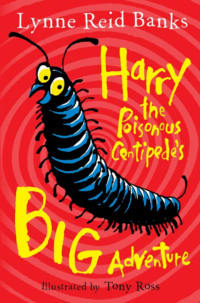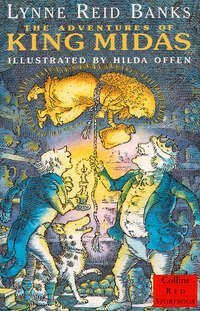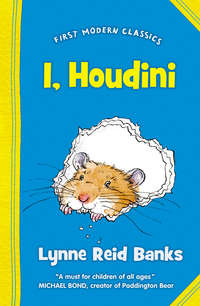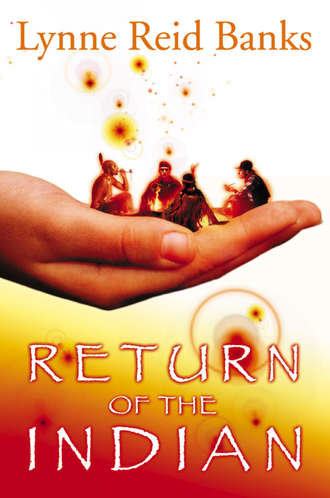
Полная версия
Return of the Indian
The chest was not only interesting and beautiful, but useful. Omri used it for storage. There was only one thing wrong with it. It had a lock, but no key. So he piled cushions and other objects on it and pretended it was a bench. That way nobody who happened to be prying about in his room (it still happened occasionally, mothers cleaning and brothers poking about ‘borrowing’) would realize that it contained a number of interesting and private objects.
Omri knelt by the chest now and shifted to the floor a pile of cassettes, a bullworker (he was bent on developing his muscles), some cushions and three copies of Mad magazine, among other bits of junk. Then he opened the top of the chest. It, too, was untidy, but Omri knew where to burrow. On their way down the left-hand side in search of the folder containing his prize-winning story, Omri’s fingers touched metal, and paused. Then, carefully, he moved some other things which were in the way, and eased this metal object out.
It was a small white cabinet with a mirror in its door and a keyhole – an old-fashioned bathroom medicine cupboard, in fact. He stood it on the Japanese table. The door swung open. Apart from a single shelf, it was quite empty – as empty as it had been when he was first given it, a rather odd birthday present from Gillon, just over a year ago.
Omri sat back on his heels staring at it.
How clearly it all came back. The cupboard. The strange little key which had been his great-grandmother’s, and which had mysteriously fitted the commonplace lock and turned this ordinary little metal box into a time-machine with a difference. Put any plastic object – an axe, an Indian tepee, a quiver of arrows – into it, close the door, turn the key – and those things became real. Miniature, but real. Real leather, real cloth, real steel. Put the plastic figure of a human being or an animal inside, and, in the time it took to lock them in, they, too, became real. Real and alive. And not just ‘living toys’, but people from another time, with their own lives, their own personalities, needs and demands…
Oh, it hadn’t been all fun and games, as Omri had naively expected at first. Little Bull was no toy, to submit tamely to being played with. He was, for all his tiny stature, a ferocious savage, war-like and domineering.
Omri had soon realized that if any grown-ups found out about the cupboard’s magic properties they would take it, and the Indian, and everything else, away. So Omri had had to keep it secret, and look after, feed and protect his Indian as best he could. And when Patrick had found out the secret, and sneaked a Texas cowboy into the cupboard so that he, too, could have a ‘little person’, the trouble really started.
Little Bull and Boone were natural enemies. They came close to killing each other several times. Even their respective ponies had caused endless difficulties. And then Adiel had taken the cupboard one day, the key had fallen out of the lock and been lost, and Omri, Patrick and the two little men had been faced with the dire possibility that the magic was dead, that these minute and helpless people would have to remain in Omri’s time, his ‘giant’ world, and in his care, for ever…
It was this, the terrible fright they had all had from this notion, that had finally proved to Omri that he would have to give up his Indian friend (for friends they were by then, of a sort), and send the little people ‘back’ – back to their own time, through the magic of the cupboard. When the key was found, that’s what they all agreed on. But it was so hard to part, that Boone (who was shamefully soft-hearted for a cowboy) had cried openly, and even the boys’ eyes were wet… Omri seldom let himself think of those last moments, they upset him so much.
When they’d reopened the cupboard door, there were the two groups: Little Bull and the wife Omri had found him, Twin Stars, sitting on Little Bull’s pony, and ‘Boo-Hoo’ Boone on his white horse – only now they were plastic again. Patrick had taken Boone and put him in his pocket. And Omri had kept the Indians. He had them still. He had packed them in a little wooden box which he kept safely at the very bottom of the chest. Actually it was a box-within-a-box-within-a-box. Each was tied tightly with string. There was a reason for all this. Omri had wanted to make them difficult to get at.
He had always known that he would be tempted to put Little Bull and Twin Stars in the cupboard again and bring them back to life. He was curious about how they were getting on – that alone tormented him every day. They had lived in dangerous times, times of war between tribes, wars aided and encouraged by Frenchmen and Englishmen who were fighting on American soil in those far-off days. Boone’s time, the time of the pioneering of Texas, a hundred years after Little Bull’s era, was dangerous, too.
And there’d been another little man, Tommy, the medical orderly, from the trenches of France in the First World War. They’d magicked him to life to help when Little Bull was kicked by his horse, when Boone was apparently dying of an arrow-wound… Tommy might, just might still be alive in Omri’s world, but he would be terribly old, about ninety by now.
By putting their plastic figures into the magic cupboard, by turning the magic key, Omri had the power to recall them to life – to youth. He could snatch them from the past. The whole business nearly blew Omri’s mind every time he thought at all deeply about it. So he tried not to think about it too much. And to prevent his yielding to temptation, he had given his mother the key. She wore it round her neck on a chain (it was quite decorative). People often asked her about it, and she would say, “It’s Omri’s really, but he lends it to me.”
That wasn’t the whole truth. Omri had pressed it on her and begged her to keep it safe for him. Safe… not just from getting lost again, but safe from him, from his longing to use it again, to reactivate the magic, to bring back his friends. To bring back the time when he had been – not happiest, but most intensely, dangerously alive himself.
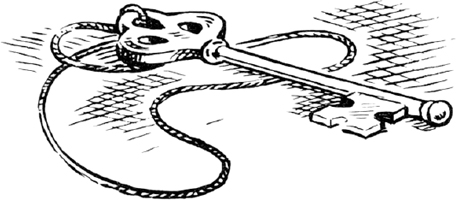
4 The Sweet Taste of Triumph
When Omri came downstairs again with the copy of his story, his brothers were both back from school.
Noticing that their parents were fairly gibbering with excitement, they were both pestering loudly to be told what had happened, but, being decent, Omri’s mother and father were refusing to spoil his surprise. However, the moment he entered the room his father turned and pointed to him.
“It’s Omri’s news,” he said. “Ask him to tell you.”
“Well?” asked Gillon.
“Go on,” said Adiel. “Don’t drive us mad.”
“It’s just that I’ve won a prize,” said Omri with the utmost carelessness. “Here, Mum.” He handed her the folder, and she rushed out of the room with it clutched to her bosom, saying that she couldn’t wait another minute to read it.
“Prize for what?” asked Adiel cynically.
“For winning a donkey-race?” inquired Gillon.
“Nothing much, it was only a story,” said Omri. It was such a long time since he had felt this good, he needed to spin it out.
“What story?” asked Adiel.
“What’s the prize?” asked Gillon at the same time.
“You know, that Telecom competition. There was an ad on TV. You had to write in for a leaflet.”
“Oh, that,” said Adiel, and went into the kitchen to get himself something to eat.
But Gillon was gazing at him. He paid more attention to ads, and he had remembered a detail that Adiel had forgotten.
“The prizes were money,” he said slowly. “Big money.”
Omri grunted non-committally, sat down at the table and shifted Kitsa, who was still there, on to his lap.
“How much?” pressed Gillon.
“Hm?”
“How much did you win? You didn’t get first prize!”
“Yeah.”
Gillon got up.
“Not… you haven’t won three hundred quid?”
Adiel’s face appeared round the kitchen door, wearing a look of comical amazement.
“WHAT! What did you say?”
“That was the first prize in each category. I thought about entering myself.” Excitement and envy were in Gillon’s voice now, making it wobble up and down in register. He turned back to Omri. “Come on! Tell us.”
“Yeah,” said Omri again.
He felt their eyes on him and a great gleeful laugh rising in him, like the time Boone had done a tiny, brilliant drawing during Omri’s art lesson and the teacher had seen it and couldn’t believe her eyes. She’d thought Omri had done it somehow. This time was even more fun, though, because this time he had.
He was sitting watching television some time later, when Adiel came in quietly and sat down beside him.
“I’ve read it,” he said after a while. His tone had changed completely.
“What? Oh, my Indian story.”
“Yes. Your Indian story.” There was a pause, and then Adiel – his ten-O-level brother – said very sincerely, almost humbly, “It’s one of the best stories I’ve ever read.”
Omri turned to look at him.
“Do you really like it?” he asked eagerly. Whatever rows he might have with his brothers, and he had them daily, their good opinion mattered. Adiel’s especially.
“You know perfectly well it’s brilliant. How on earth did you dream all that up? Coming from another time and all that? It’s so well worked-out, so… I dunno. You actually had me believing in it. And working in all those real parts, about the family. Blimey. I mean it was terrific. I… now don’t take this the wrong way, but I can’t quite credit that you made it all up.”
After a pause, Omri said, “What do you mean? That you think I nicked it from a book? Because I didn’t.”
“It’s entirely original?”
Omri glanced at him. “Original? Yes. That’s what it is. It’s original.”
“Well, congratulations anyway. I think it’s fabulous.” They stared at the screen for a while and then he added, “You’d better go and talk to Mum. She’s sobbing her eyes out.”
Omri reluctantly went in search of his mother, and found her in the conservatory at the back of the house watering her plants. Not with tears – to his great relief she was not crying now – but she gave him a rather misty smile and said, “I read the story, Omri. It’s utterly amazing. No wonder it won. You’re the darkest little horse I ever knew, and I love you.” She hugged him. He submitted briefly, then politely extricated himself.
“When’s supper?”
“Usual time.”
He was just turning to go when he stopped and looked at her again. Something was missing from her general appearance. Then he saw what it was, and his heart missed a beat.
“Mum! Where’s the key?”
Her hand went to her neck.
“Oh… I took it off this morning when I washed my hair. It’s in the upstairs bathroom.”
Omri didn’t mean to run, but he couldn’t help it. He had to see the key, to be sure it wasn’t lost. He pelted up the stairs and into his parents’ bathroom. The key was there. He saw it as soon as he went in, lying on the ledge beside the basin with its silver chain coiled around it.
He picked it up. It was the first time he’d held it for a year. It felt colder and lighter than he remembered. Its twisted top and complicated lock-part clicked into place in some memory-pattern. And something else clicked at the same time, something which had been hovering in his mind, undefined, since he’d read the letter.
His story was original. Adiel had relieved his mind when he’d used that word. Even if you didn’t make a story up, if you had the experience, and you wrote about it, it was original. So he hadn’t cheated. But the story wasn’t only his. It also belonged to the little men – to Little Bull, and Boone, and even to Tommy, the World War One soldier. (It belonged to Patrick, too, but if Patrick had decided to deny it ever happened, then he’d given up his rights in it.)
And suddenly Omri realized, as he looked at the key, that his triumph wouldn’t really be complete until he’d shared it. Not just with his parents and brothers, or with the kids at school. No prize, no party, could be as good as what he was thinking about now. This was his reason – his excuse – to do what he’d been yearning to do ever since that moment when the cupboard door closed and transformed his friends back into plastic. Only with Little Bull and Boone could he share the secret behind his story, the most exciting part of all – that it was true.
He turned, went out of the bathroom and up the remaining stairs to his attic room.
Not for long, he was thinking. I won’t bring them back for long. Not long enough to cause problems. Just long enough to have a good talk. To find out how they are.
Maybe Twin Stars had had a baby by now – a papoose! What fun if she brought it with her, though it would be almost too tiny to see. Little Bull had made himself a chief while he was with Omri, but when he returned to his own place, his father might still be alive. Little Bull wouldn’t like being an ordinary brave again! And Boone – the ‘crying cowboy’ with a talent for art, a deep dislike of washing, and a heavy thirst… It made Omri grin to think of him. Writing about the little men and their adventures had made them so clear in his mind that it hardly seemed necessary to do what he was going to do.
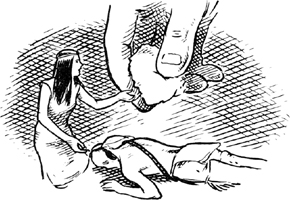
5 From Dangerous Times
With hands that shook, Omri probed into the depths of the chest till he found the box-within-a-box-within-a-box. He eased it out and closed the lid of the chest and put the boxes on top. Reverently he untied the string on the largest box, opened it, took out the next, and repeated the operation.
In the last box, carefully wrapped in cotton-wool, was the plastic group consisting of a brown pony, an Indian brave, and an Indian girl in a red dress. The brave’s left hand was upraised in farewell, his other arm circled the girl’s waist and held the rope-rein. The girl, her long brown legs hanging on each side of the pony’s withers, had her hands buried in its mane. The pony’s head was alertly raised, its ears almost meeting above its forelock, its feet braced. Omri felt himself quivering all over as he stood the tiny figures on his hand and stared at them.
“You’re coming back,” he whispered – as if plastic could hear. But they wouldn’t be plastic long!
The cupboard was ready. Omri stood the figures, not on its shelf but on its metal floor. Then he took a deep, deep breath as if he were going to dive into a cold, uncertain sea. He fitted the key into the lock, closed the door, and turned it.
Let it still work. Let it…
He barely had time to think his thought before he heard the tiny, familiar sound – minute, unshod hooves drumming and pawing on the metal!
Omri let his breath out in a rush. His heart was thumping and his right hand shook.
His fingers were still round the key. In a second he had turned it back and opened the mirrored door. And there they were…
No. No!
Omri’s fists clenched. There was something terribly wrong. The three figures were there, all right. The details of life, which the dull-surfaced plastic blurred, were there again. The shine on the pony’s coat, the brilliance of the red dress, the warm sheen of brown, living skin. But…
The pony was right enough. He was prancing and stamping his hooves, fretting his head against the rope. As Omri opened the door and the light fell on him, he pricked his ears again and whickered nervously. On his back sat Twin Stars. But she was no longer in front. She sat back, almost on the pony’s haunches. And before her, but lying face-down across the pony’s back, was a limp, motionless form.
It was Little Bull. Omri knew it, although he couldn’t see his face. His head and arms hung down on one side of the horse and his legs on the other. His buckskin leggings were caked with earth and blood. Omri, against his will, forced himself to peer closer, and saw to his utter horror where the blood had come from. There were two bullet-holes, almost too small to see, high up on his back.
Omri’s mouth was wide open with shock. He looked at Twin Stars. She was holding the pony’s rein-rope now. Her other hand rested on Little Bull’s broad shoulders as if to steady him and stop him sliding off the pony’s back. Her face was frenzied. She had no tears in her eyes but they were so round Omri could see the sparks of light in the whites. Her tiny teeth were clenched in a desperate grimace.
When she saw Omri, she started like a fawn with fear, but then the fear faded from her face. Her hand left Little Bull’s back for a moment and reached out toward Omri. It was a gesture of frantic appeal. It said Help us! clearer than words. But Omri couldn’t move or speak. He had no notion how to help. He only knew that if he didn’t, if someone didn’t, Little Bull would die. Perhaps – perhaps he was dead already! What could he do?
Tommy.
Tommy’s medical knowledge was not exactly up to date. How could it be, when he had only been a medical orderly in the First World War? But he was the best idea Omri could come up with, shocked and numbed as he was.
He beckoned Twin Stars forward with one hand, and while she was guiding the pony over the bottom edge of the cupboard, Omri reached back into the smallest box. The plastic figure of the uniformed soldier was at the bottom, complete with his bag with the red cross on it.
As soon as the cupboard was empty, the horse and riders clear of the door, Omri slipped Tommy in and closed it again, turning the key forward and back in a second. That was all the magic took.
“It’ll be all right,” he said to Twin Stars, as she sat on the pony on top of the chest near his face. “Tommy will fix him.” Then he opened the door again eagerly, and reached his hand in.
The bag was there. And the uniform, neatly folded, with the orderly’s cap upside down on the top of the pile. And the boots. And the puttees, the khaki bandages they wore round their legs in that war, neatly rolled, inside the cap. Nothing else.
Omri let out a cry. He slammed the cupboard door to shut out the sight of that neat little pile of clothes, empty of their owner who no longer needed them. He knew, instantly. He knew that Tommy didn’t live to be an old man. That one of those big German shells he had talked about, those ‘Minnies’, or perhaps some other weapon, had got him. His snubby, cheerful face, his bravery and his gentle hands were gone, with so many thousands of others, into the mud of the trenches.
Omri had never experienced death at close hand. No one he knew well had ever died. An uncle had jumped the twig’, as his father called it, last year, but in Australia. A boy at school had been killed in a car crash, but he wasn’t in Omri’s class.
The realization of Tommy’s death – even a whole year after he had last seen him – came as a ghastly shock. He had no one to share this with – and in any case there was no time. Standing at his elbow was the pony, tossing his head as if in impatience, heedless of anything which delayed attention to his master. Twin Stars’ bright, staring eyes were fixed on him. Waiting. Trusting.
Later. He would think about Tommy, and mourn for him. Later. Who would understand better than Tommy that you have to look after the wounded before mourning the dead? Rubbing his hand across his mouth, Omri looked around helplessly, and then he faced Twin Stars.
How much English did she know? During her brief time with him, before, he had never spoken directly to her – she had only spoken to Little Bull, in their own language. Now he must make her understand.
“No good,” he said slowly. “No help.”
She looked blank, although the shining hope faded a little from her face. To make matters plain, Omri opened the cupboard again, and took Tommy’s plastic figure – which had come back, replacing the pitiful little pile of his uniform – and stood it before the Indian girl. She slipped from the pony’s back and, holding the rope, touched the figure.
She seemed to realize at once that there was no help to be looked for there. She turned swiftly back toward Omri.
“Help. You,” she said in a clear, silvery voice.
Omri felt sheer desperation clamp down on his heart, already heavy with sadness. He followed Twin Stars’ pointing finger at the lifeless-looking body across the pony.
“We must lay him flat,” he said at last. It was all he could think of. But it could not be all he could do. He must think. He must think!
He watched Twin Stars struggling to lift Little Bull’s heavy body off the horse. He helped as much as he dared, terrified his big, clumsy fingers would damage him, but at least he could make his hand into a kind of platform to lower Little Bull to the ground. With his other hand he pulled his box of tissues towards him and made a makeshift mattress out of several of them. At least they were soft and clean. Soon Little Bull was lying stretched on his stomach.
Omri had been through something like this before – when Little Bull had shot the cowboy, Boone. That time, Tommy had been brought in to help. He had had some tiny instruments, dressings and medicine. Crude as his old-fashioned methods were, they had worked. Omri felt poignantly the absence of an old friend, as one does – not just missing the person, but missing his skills, his role in one’s life. For a moment, he felt almost angry with Tommy for being dead when he was so badly needed.
Twin Stars, who was kneeling beside Little Bull, looked up. She said something. It was some Indian word. Omri shook his head. Twin Stars wrung her hands. She pointed to the two bullet-wounds, and said the word again, louder. It must be some special Indian remedy she wanted. And for the first time, Omri thought, She might be better off where she came from. She’d know what to do there.
But at least he could clean the wounds. He knew how to do that much. He had some mouthwash, horrible stuff his mother made him gargle with when he had a cold. The bottle was on his shelf. He jumped up and fetched it. His head was spinning. He was beginning to realize how insane it had been to start this business again. He was remembering the awful sense of responsibility, the anxiety, the unending succession of problems to be solved… and this time he didn’t even have Patrick to give him occasional support or good ideas.
Patrick… But Patrick was useless. He didn’t even believe any more.
Omri flooded a bit of the cotton-wool from the box with the disinfectant and handed it to Twin Stars, making swabbing gestures to show her what it was for. She caught on quickly. With light, delicate strokes she cleaned the blood off Little Bull’s back. No more seemed to be coming from the holes. Omri, remembering that injured people have to be kept warm, and noticing that Twin Stars was shivering, snatched up one of the gloves he’d worn to school and recklessly cut the little finger off it with some scissors. The Indian was soon inside the woollen finger, which was like a sleeping-bag. Omri and Twin Stars looked at each other.
“How?” Omri asked. “How did it happen?”
Twin Stars’ face grew hard.
“Soldier,” she said. “Fight. Gun.”
“In the back?” Omri couldn’t help asking. It was hard to imagine anyone as brave as Little Bull getting shot in the back.
“Horse fall,” she said. “Little Bull lie. Ground. Soldiers shoot.” She pointed an imaginary weapon, a rifle, or a musket, gestured one, two, then waved her hand sharply to show the soldiers had run on, leaving Little Bull to die.


